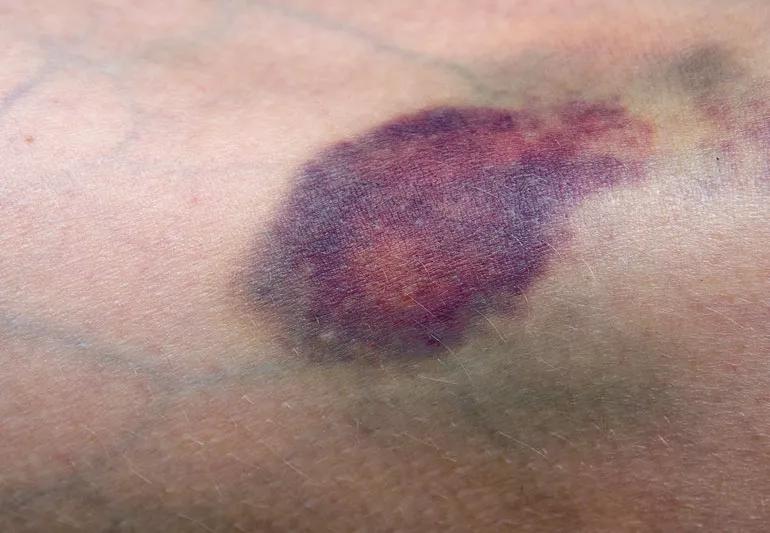Why bruises develop and how doctors evaluate them

Image content: This image is available to view online.
View image online (https://assets.clevelandclinic.org/transform/d7160276-48fe-4d10-83ba-76bb0012bb4d/bruiseEasily-174630516-770x533-1_jpg)
Bruise on leg
You’re undressing or showering and discover a bruise on your leg or arm. Baffled, you wonder: “Where did that come from? I don’t remember bumping into anything.”
Advertisement
Cleveland Clinic is a non-profit academic medical center. Advertising on our site helps support our mission. We do not endorse non-Cleveland Clinic products or services. Policy
You may never pinpoint the source. The bruise eventually disappears, along with your concern. But bruising shouldn’t always be dismissed so easily, says hematologist Dana Angelini, MD.
“It’s common to bump into things, not remember, and see small bruises on your legs or arms,” she says. “However, unprovoked bruises on your torso, back or face are unusual. And that’s a reason to get them checked out.”
Here’s what you should know about bruising.
You may get a bruise from a bump or injury to the skin or the tissues beneath the skin. Since the skin isn’t cut or broken, you won’t see external bleeding. But damage to blood vessels below the skin causes them to rupture and leak blood.
Blood pooling and clotting beneath the surface causes skin discoloration. At first, the skin is often red or purplish. As the bruise heals, it may turn brown, green or yellow. The area often is swollen, tender or painful.
Minor accidents — running into furniture, falling, dropping something on your leg, hand or foot — are the most common cause of bruising.
Some over-the-counter medicines such as aspirin, non-steroidal anti-inflammatory drugs (like ibuprofen), Plavix® (clopidogrel) and blood thinners (like Coumadin®) can increase your tendency to bruise. So can prescription medicines, such as certain antidepressants.
Advertisement
“Even over-the-counter supplements such as garlic, ginkgo, ginseng and fish oil can inhibit normal platelet function and cause bruising,” Dr. Angelini says.
Age is another factor. Older adults may bruise more easily than younger people. Their thinning skin often has less fat underneath to cushion the blood vessels.
Other possible causes of bruising include:
Bruises due to minor injuries or accidents usually disappear on their own after a week or two. During the healing process, the bruise will change color before fading away. But it’s a good idea to get a bruise checked out by your doctor if it:
During an office visit, your doctor will review your family and personal medical history. You’ll answer questions like:
If your doctor decides medication is probably causing your bruising, they will discuss other options. “We’ll do a risk-benefit analysis,” Dr. Angelini says. “If life is going well, we might opt to keep you on the drug if it’s helping you control another disease. If the bruising is severe or interfering with your daily life, we’ll talk to the prescriber about replacing it with another medication.”
When the cause of bruising is unclear, your doctor will likely order blood work to check for platelet problems or other blood clotting abnormalities.
But don’t hesitate to ask your doctor for help. “We do a lot of consultations for bruising. When a serious bleeding disorder is ruled out, we’re happy to provide reassurance,” she says.
Advertisement

Sign up for our Health Essentials emails for expert guidance on nutrition, fitness, sleep, skin care and more.
Learn more about our editorial process.
Advertisement
This type of bruise might benefit from warm compresses, but time is really the healing key
On average, bruises last one to three weeks, and bigger bruises last longer than smaller ones
Bleeding is a risk and warrants taking care, but the reward of this lifesaving medication is great
Severe and debilitating headaches can affect the quality of your child’s life
With repeat injections over time, you may be able to slow the development of new wrinkles
Type 2 diabetes isn’t inevitable with these dietary changes
Applying a hot or cold compress can help with pain
Pump up your iron intake with foods like tuna, tofu and turkey